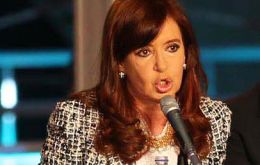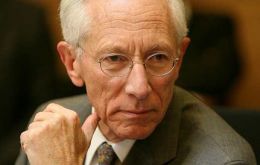MercoPress. South Atlantic News Agency
Economy
-
Saturday, May 31st 2014 - 06:08 UTC
Uruguay's FDI equivalent to 5% of GDP and mostly in alternative energies, said Eclac report

Foreign direct investment in Uruguay totaled 2.79bn dollars last year, which is slightly higher than the 2.68bn of 2012, equivalent to 5% of GDP, according to the latest report on FDI for the region from the UN Economic Commission for Latin America and the Caribbean.
-
Saturday, May 31st 2014 - 06:05 UTC
Brazil's economy grows 0.2% in the first quarter and 1.9% in twelve months

Brazil's economy grew 0.2% in the first quarter compared to the final three months of 2013, a pace slower than economists had forecast, the government said Friday. Meanwhile GDP rose 1.9% relative to the first quarter of 2013, according to figures released by the state-run Brazilian Institute of Geography and Statistics, or IBGE.
-
Friday, May 30th 2014 - 05:28 UTC
Argentina can resume business with country export credit agencies, following Paris Club deal

Argentine president Cristina Fernandez praised on Thursday the agreement reached with Paris Club creditors and said that the government will now turn to international credit markets to finance “infrastructure, development, and technology.”
-
Friday, May 30th 2014 - 05:11 UTC
France praises Argentina's agreement with Paris Club and normalization efforts

French Finance Minister Michel Sapin praised Argentina’s agreement with Paris Club creditors, saying it highlights the country’s effort to “normalize its relations with creditors.”
-
Friday, May 30th 2014 - 05:06 UTC
Stanley Fischer sworn in as member of the US Federal Reserve

Former Bank of Israel Governor Stanley Fischer was sworn in as a member of the Federal Reserve's board this week, buttressing the U.S. central bank's depleted policymaking ranks as officials map out plans to exit from their extraordinary stimulus.
-
Friday, May 30th 2014 - 04:59 UTC
Cold weather shrinks US economy growth in the first quarter

The US economy shrank by an annualized 1% in the first three months of 2014, official estimates have shown. It is the worst economic performance since the first quarter of 2011 and a big fall on the 2.6% rise in economic output in the final quarter of last year.
-
Thursday, May 29th 2014 - 06:07 UTC
Buenos Aires City households need 1.300 dollars per month; 25% don't make that sum

A family living in Argentina's capital, Buenos Aires needs 10.454 Pesos to make it to the end of the month, according to the city's stats and census office. The average household refers to a couple with two children, that pays rent and does not include transport, private education or health care.
-
Thursday, May 29th 2014 - 06:00 UTC
US Lower House approves legislation to impose sanctions on Venezuela

The US House of Representatives passed legislation on Wednesday, to impose sanctions on Venezuelans responsible for human rights abuses during anti-government protests, despite Obama administration worries that they could threaten talks seeking to ease the unrest.
-
Thursday, May 29th 2014 - 05:51 UTC
Brazil's central bank opted to leave rate unchanged at 11%, “at this moment”

Brazil left its benchmark interest rate unchanged on Wednesday. In a unanimous decision, the central bank's monetary policy committee, Copom, kept the Selic rate at 11%, breaking a streak of nine consecutive hikes as expected by a majority of analysts and market traders.
-
Thursday, May 29th 2014 - 05:37 UTC
Argentina announces an understanding with the Paris Club on defaulted debt

Following twelve hours of discussions the Argentine delegation headed by Economy Minister Axel Kicillof managed on Wednesday to agree the main points for Argentina to overcome the approximately 9.5bn dollars default with countries that make up the Paris Club, according to late reports from the French capital.
